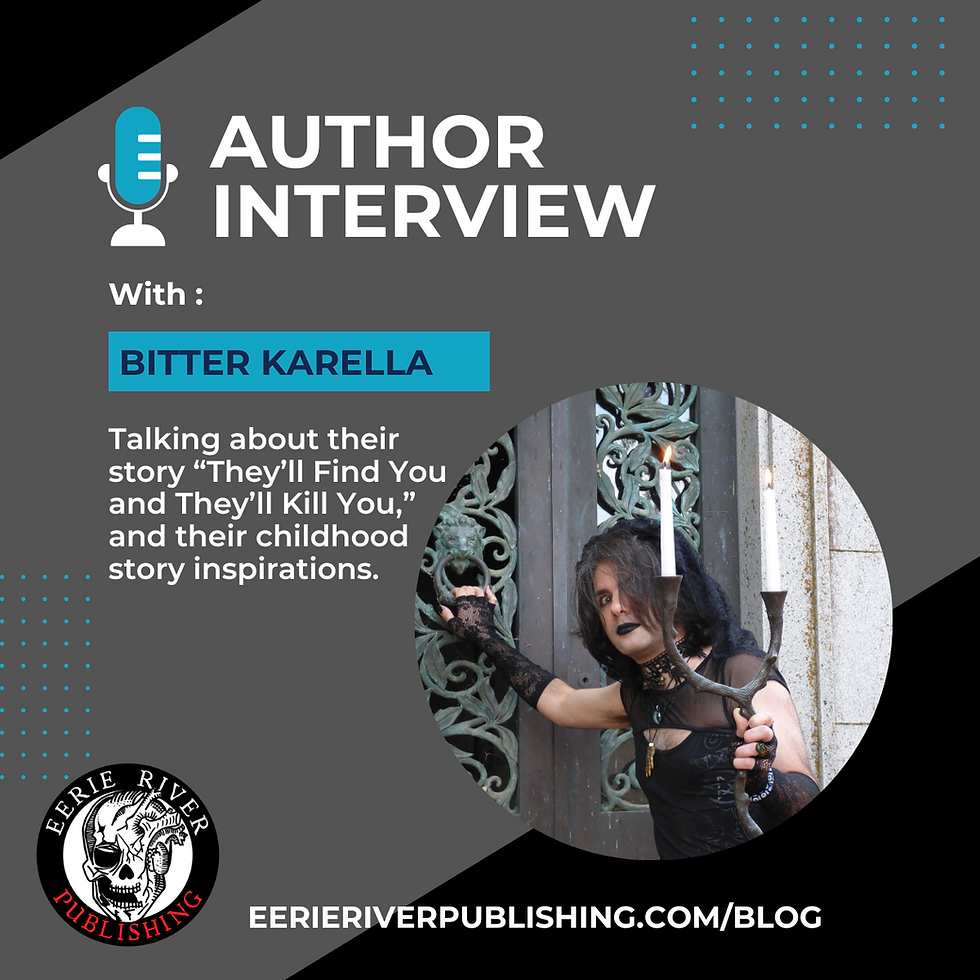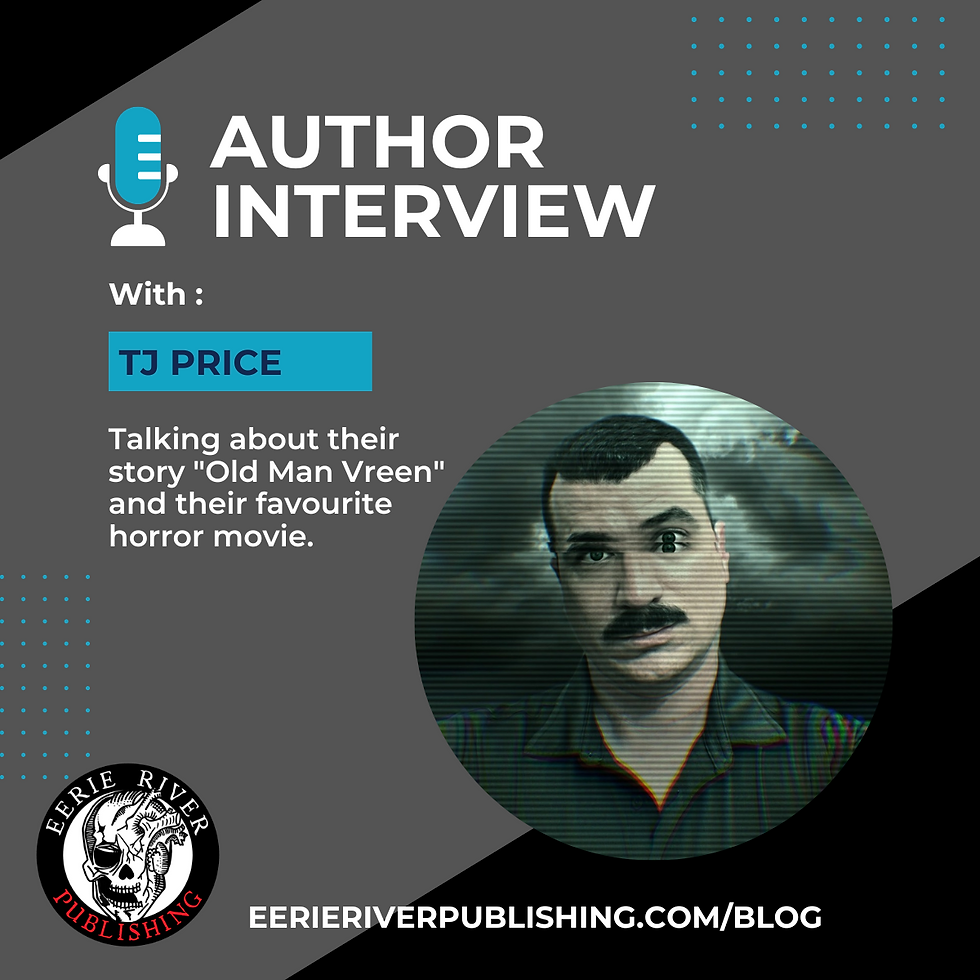WiHM Spotlight: V. A. Vazquez
- Eerie River

- Feb 16, 2021
- 6 min read

Tell us a little bit about yourself and how you became a Woman In Horror writer. V. A. Vazquez is a pen name. Yes, I’m one of those women who uses gender-neutral initials. However, that has less to do with concealing my gender, and more to do with the fact that I’m a state-certified middle school teacher who writes very non-middle school appropriate fiction. I’m originally from New York but now reside in the UK with my husband and our wee doggo. When I first arrived here, I didn’t have a visa that allowed me to work, so I decided to start writing instead. That decision has (unfortunately for everyone around me) stuck.
Did you know you wanted to write other genres as well as horror? Were you always interested in writing horror specifically? Back in middle school, the only videos I wanted to rent at Blockbuster were from the horror section. But my father (the one doing the actual renting) remained firm on the MPAA parental guidelines. There would be no watching Scream until my senior year of high school. Even Poltergeist, which had a PG rating, was off-limits until fifth grade. But while films remained strictly forboden, my parents were willing to buy me whatever books I wanted to read. So I snatched up a copy of Thomas Harris’ The Silence of the Lambs and never looked back. While horror has always been my genre, the books I read during middle school instilled a specific love for fictional serial killers that has never gone away. When I started writing a few years ago, horror seemed like the natural starting point. I tried to imitate the dark, brooding psychological thriller novels I enjoyed reading, like ones by Jennifer Hillier and Rachel Caine, but everything came out too comedic. So I started dabbling in other genres, like rom-com, where my authorial voice might be a better fit. But there was no spark there. Finally, I picked up a copy of Grady Hendrix’s Horrorstör and decided to lean hard into horror-comedy. There are many ways to write horror stories; don’t fall into the trap of thinking you need to sound like everyone else. Are there tropes, particularly those about women in horror, you actively avoid in your writing? Horror has always been one of the most feminist literary and film genres. (If you want to write horror, and you’ve never read Carol Clover’s Men, Women, and Chainsaws, I highly recommend picking up a copy.) This is especially true of my favorite subgenre: the slasher. However, I don’t like that you can usually tell who the Final Girl will be from the first page/frame. She’s the Nice Girl. In fact, she often starts the narrative with a scene proving she’s not like other girls. She doesn’t want to get drunk at the cabin in the woods; she just wants to study for her upcoming exams! She would never be mean to the outcast character; she’s everyone’s best friend! She’s not going to flirt with all the attractive men; she’s in a committed relationship! She wears short skirts, I wear T-shirts — that whole shtick. I like my protagonists to be the ones who, in any eighties movie, would be cannon fodder. In the first short story I had published (in Eerie River’s It Calls from the Forest Volume 2), my protagonist was a tactless, tasteless YouTuber who fucked serial killer lookalikes for a living. I almost exclusively write women who are unlikeable, problematic, and/or monstrous in some way. I don’t want to write about Nice Girls. And I don’t want Nice Girls to be the only ones who get to be Final Girls. What is one underappreciated female author we should all check out? Hailey Piper. I first read her short story, “The Law of Conservation of Death”, in a Bronzeville Books anthology. She has a sweeping, lyrical writing style, which isn’t something I normally enjoy, but it works so well for the stories she wants to tell. Many of her stories explore feminism and gender identity. If you’re looking for something to read in honor of Women in Horror Month, might I recommend The Worm and His King? It’s a stunning cosmic horror novella that takes place in 1990s Manhattan and features a young woman searching for her missing girlfriend in the tunnels underneath the city. (Bonus: many of Piper's stories feature trans protagonists, which are unfortunately still hard to find in the horror genre.) Terrifying, tragic, and highly recommended. How do you position your horror fiction when selling to agents, publications, etc. to ensure it's not relegated to just "genre fiction?" Someone once posted that he didn’t want to become “the E. L. James of Horror.” I remember thinking, That’s it. I’ve found my dream job description. I personally would love to be relegated to “genre fiction” because people enjoy genre fiction. I dream of someday writing a novel that’s stocked on the shelves of Walmart or Tesco. Don’t get me wrong: there are many horror novels that qualify as literary fiction, and I love reading them from time to time. But my favorite horror films are the B-movies stuffed with as much karo syrup and red food coloring as the producers could fit in their grocery carts. There’s an unbridled joy to these films, an enthusiasm for the genre, that you don’t see as much in their more artistic counterparts. I try to capture that joy as much as I can in the stories that I write. Tell us about the first piece of writing you had published and how that impacted you? The first short story I ever had published was with Eerie River Publishing: “Dating in Murderville” in It Calls from the Forest, Volume 2. I love writing short stories because they help me determine which ideas are worthy of being fleshed out into full-length novels and which ones aren’t. I’ve written some short stories that I loved — but you get to the end of 3,500 words and think, Well, that’s all there is to say about that topic. But some of them are begging to be extended to 90,000 words. “Dating in Murderville” was one of those stories that needed some extra attention. (Also, I enjoy coming up with inappropriate voiceovers for true crime episodes: Join us as we sit down for dessert with this canni-bae.) I know a lot of authors say that if you want to write novels, don’t waste your time with short stories because long-form fiction is a completely different art form. And to some extent, I agree. I’m much better at writing short stories because I’m good at punchy ideas and snappy dialogue. It’s much harder for me to develop a compelling character arc over hundreds of pages. But if you want to write novels, I still recommend spending some time on short stories so you can start to identify which ideas have sticking power. It’s the zombie apocalypse and somehow you find yourself locked in a room with two other people and a horde of zombies on the other side of the door. There is no food or water, you have to leave to survive. Real or Fiction, who would you want in that room with you? In the event of a zombie apocalypse, my goal has always been to be Zombie #1. Think about it. It’s clearly the best position to be in. Since you’re the first person infected, you’re just like — Bam! Zombie! There’s no running away from zombies, no living in fear of becoming and/or being eaten by a zombie, no realizing that zombies aren’t the real threat (spoilers: IT’S MAN!). Plus, you’ve got your choice of all the best brains; it’s like being first in line to the buffet. And if someone nails you with a headshot, meh, you were already dead anyway. What have you got to lose?
What are you up to in 2021? What are your links? V. A. Vazquez writes about women (and men and non-binary folk) romancing monsters. You can always count on her short stories to feature sexy-times with a stabby-stabby serial killer or a many-tentacled cryptid or even the demon that’s currently possessing you. She’s a member of the Romantic Novelists’ Association's New Writers Scheme, currently working on her first novel. You can hang out with her at: Twitter: @vavazquezwrites (https://twitter.com/vavazquezwrites) Facebook: https://www.facebook.com/vavazquezauthor Website: http://www.vavazquez.com/




Comments